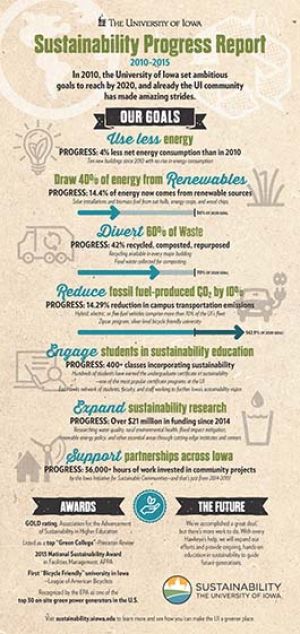College of Liberal Arts & Sciences
UI Marks Progress on 2020 Sustainability Goals

The University of Iowa has made significant progress on its 2020 Vision Sustainability Goals.
Liz Christiansen, director of the Office of Sustainability, reported on the mid-term progress of the goals from 2010 to 2015 at an Earth Day open house April 22 in the Office of Sustainability.
The seed for 2020 Vision plan was planted on Earth Day 2008, when former UI President Sally Mason issued a challenge to the university to make sustainability a central aspect of its mission. In the mid-2000s, sustainability emerged in higher education as a major issue and UI students, faculty and staff demanded action from administration. In 2008, the Office of Sustainability was established and Christiansen was hired as director.
The planning effort to develop the goals included input from hundreds of people - faculty, staff and students, as well as UI administrators and external partners such as US EPA, Iowa Department of Natural Resources, Iowa Department of Economic Development and community partners and representatives from non-profit organizations such as Sierra Club. The resulting 2020 Vision is ambitious and forward-looking that includes reaching but achievable goals.
Key progress:
Goal #1: Become a net-negative energy consumer, consuming less energy on campus in 2020 than in 2010, despite projected growth
Progress: After implementing an aggressive energy reduction program, the UI is using 4% less energy than in 2010. Ten new buildings have been added to the UI campus since 2010 with no rise in energy consumption.
Goal #2: “Green” the university’s energy portfolio, reaching 40 percent renewable energy consumption on campus by 2020.
Progress: Renewable energy use is now at 14.4 percent. Coal use has been significantly reduced through the use of biomass fuels including oat hulls, wood chips and miscanthus grass being co-fired with coal in the UI Power Plant.
Goal #3: Reach 60 percent waste diversion by 2020.
Progress: The campus has achieved 42% waste diversion as of the end of 2015. There is now recycling in every major building and almost all dining area food wastes collected for composting.
Goal #4: Achieve 10% reduction in per capita emissions of fossil fuel-produced CO2 from university-related transportation and travel
Progress: The campus has reached a 14.29 percent reduction in UI-related transportation and travel. Over 60 percent of the UI campus fleet is hybrid, electric or flex-fuel. Zipcar was introduced in 2012 and the UI became Iowa’s first Bicycle Friendly University in 2014, with a Silver designation.
Goal #5: Student success in sustainability
Progress: The undergraduate certificate in sustainability is among the most popular certificate programs at UI. Students have over 400 sustainability-related and focused classes to choose from and many co-curricular opportunities. Hundreds of Eco Hawks, the UI community of students, faculty and staff, are working every day to make the campus more sustainable.
Goal #6: Expand research into sustainability-related areas, special focus on water
Progress: Over $21,000,000 for sustainability-related research has been secured since 2014. Research is taking place in water quality, rural environmental health, food impact mitigation, and renewable energy policy in the UI’s cutting edge institutes and centers.
Goal #7: Build partnerships for a sustainable Iowa and respond to the needs of the green economy
Progress: Through the Iowa Initiative for Sustainable Communities, UI students and faculty have invested 36,000+ hours in community projects. The Tippie College of Business provides students opportunities to provide organizational consulting to ensure Iowa businesses remain competitive, as well as green!
Next Steps
UI President Bruce Harreld has declared sustainability “the most important issue of the 21st century.” He recently called on campus leaders to ensure that students learn skills to tackle complicated problems and to expand research that will lead to sustainable solutions.
The UI Sustainability Charter Committee, comprised of students, faculty and staff representatives, is currently developing new initiatives to meet President Harreld’s challenge. “We have accomplished quite a bit in the first five years of our 2020 Vision,” said committee co-chair Brian Thompson. “With focused work and the President’s leadership, we will achieve our goals and be in the position to reach for new targets.”
